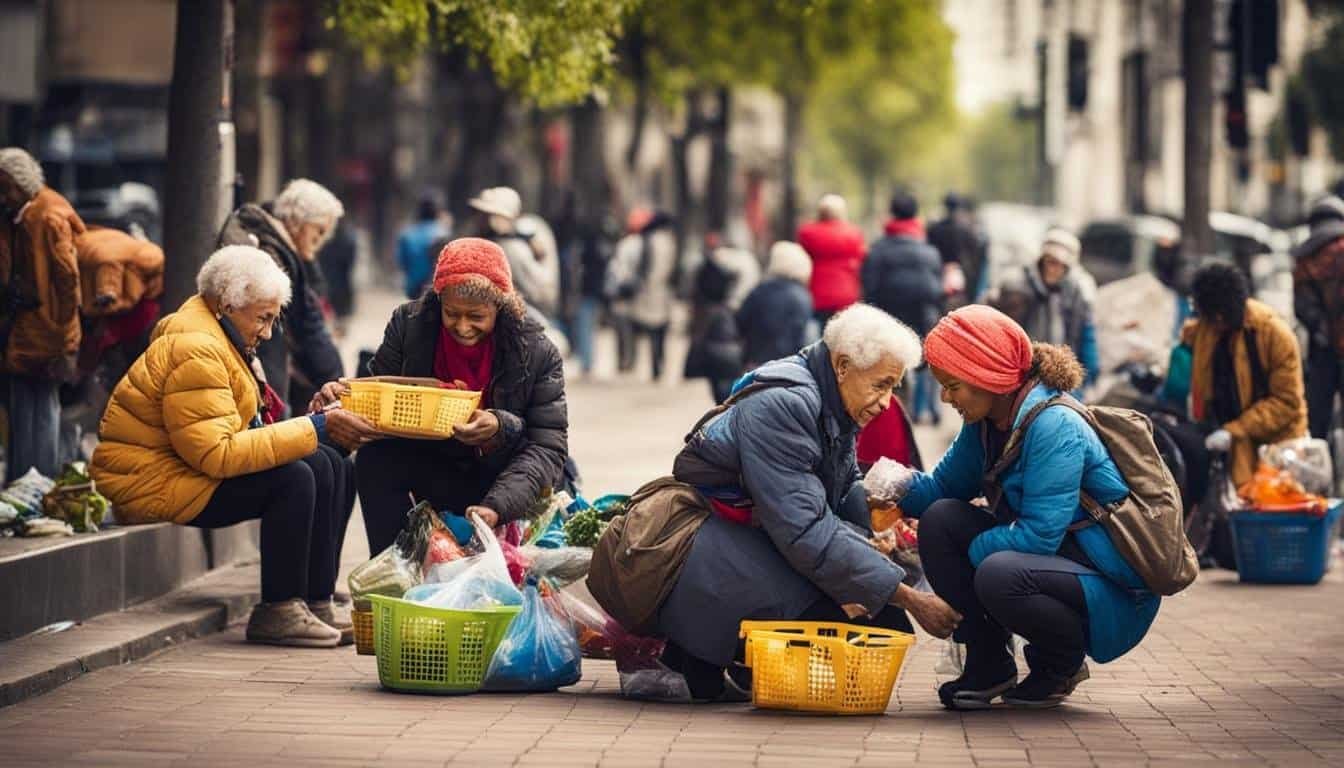The Power of Altruism: Unlocking Selfless Actions
Altruism is a remarkable and potent trait that involves selfless concern for the welfare of others. It encompasses acts of kindness, compassion, and selflessness that can have a transformative impact on individuals and communities. When you engage in acts of kindness, you not only help others but also experience a sense of fulfillment and purpose. The act of helping others, whether through volunteering, charitable deeds, or community service, allows you to tap into your empathy and compassion, fostering a deeper connection with those around you. Altruism is a fundamental aspect of humanity that brings out the best in us and promotes a more caring and supportive society.
Key Takeaways:
- Altruism involves selfless concern for the welfare of others.
- Acts of kindness, compassion, and selflessness can have a transformative impact on individuals and communities.
- Engaging in altruistic actions fosters a deeper connection with others and promotes a more caring society.
- Altruism can be expressed through volunteering, charitable deeds, community service, and other forms of support for those in need.
- Practicing altruism brings about a sense of fulfillment and purpose in your own life.
Understanding Altruism: Motivations and Definitions
Altruism, the selfless concern for the welfare of others, is a remarkable and powerful trait that can have a transformative impact on individuals and communities. To truly understand the concept of altruism, it is essential to explore its motivations and definitions.
Altruism can be defined as behavior that is voluntary, undertaken without expecting external rewards, and intended to enhance the welfare of others. It goes beyond mere acts of kindness and encompasses a deep sense of empathy and compassion towards others.
One of the motivations behind altruistic behavior is needs-centered motives. Individuals may be driven to help others based on their recognition of a specific need, such as providing food or shelter to someone who is homeless or offering emotional support to a friend in distress.
Religious or spiritual beliefs can also serve as a powerful motivation for altruism. Many faith traditions advocate for acts of kindness and selflessness as a means of expressing one’s devotion to a higher power and fulfilling their moral duty towards others.
Abstract ideals like humanism, which emphasizes the inherent value and worth of every individual, can also inspire altruistic behavior. Humanists believe in the importance of promoting the well-being of others and fostering a more compassionate and just society.
Sociopolitical factors can also influence altruism. Individuals may engage in altruistic acts as a means of advocating for social justice, addressing systemic inequalities, or effecting positive social change.
Altruistic behavior is not solely determined by internal factors; situational conditions can also play a role. For example, witnessing someone in need or being part of a community that values helping others can prompt individuals to engage in acts of altruism.
Ideological leanings, values, and norms shape our behavior and can influence the extent to which we engage in selfless actions. Our personal beliefs and convictions guide our decision-making process and may prioritize the well-being of others.
Emotions, particularly empathy, play a crucial role in motivating altruistic behavior. Empathy allows individuals to connect with and understand the emotions and experiences of others, fostering a genuine desire to alleviate their suffering and enhance their well-being.
Positive relationships with others can also foster altruistic behavior. When we have strong bonds with family, friends, and community members, we are more likely to engage in acts of kindness and support towards them.
To truly grasp the complexities of altruism, it is important to recognize the various motivations that drive individuals to help others. By understanding the definitions and motivations behind altruistic behavior, we can cultivate a deeper appreciation for the power of selflessness in making a positive difference in the world.
Altruism in Urban Settings: Overcoming Challenges
Historically, low-income urban communities have been portrayed as morally chaotic spaces with limited social capital. However, research has shown that even in challenging urban environments, individuals engage in altruistic acts, driven by factors such as relationships, personal values, and abstract ideals. Positive interpersonal relationships can be fostered through altruism, even in settings with economic and social challenges.
“Altruism connects people across urban communities, helping to build social capital and strengthen bonds. Through acts of kindness and selflessness, individuals in these settings overcome challenges and foster positive relationships.”
In urban areas, where economic disparities and social issues are often prevalent, altruism plays a vital role in building a sense of community and enhancing well-being. When individuals extend a helping hand to their neighbors, they contribute to the creation of a supportive environment and promote positive social change.
Altruistic actions in urban settings also have the potential to address the challenges faced by marginalized groups and bridge gaps in the community. By acknowledging and understanding the unique needs of these communities, individuals can actively participate in initiatives aimed at fostering social justice and equality.
The Role of Social Capital in Altruistic Acts
Social capital refers to the networks, relationships, and norms of trust that exist within a community. In urban settings, where social capital may be lacking due to economic disparities and social fragmentation, altruism can serve as a powerful tool to bridge these gaps. By engaging in acts of kindness and selflessness, individuals contribute to the accumulation of social capital, strengthening the fabric of the community and creating opportunities for collaboration and collective well-being.
Altruism in urban communities helps establish positive relationships among individuals who may have otherwise been alienated or marginalized. This sense of connectedness fosters a supportive environment where shared goals can be pursued, and collective action can be taken to address the challenges faced by the community as a whole.
Overcoming Challenges through Altruism
Urban communities face diverse challenges, ranging from economic inequality and crime rates to inadequate access to healthcare and education. Through altruism, individuals in these communities can come together to address these challenges and create a positive impact.
By channeling their resources, skills, and efforts toward philanthropic endeavors, individuals can help uplift their community and improve the lives of those around them. Altruistic initiatives such as community gardens, mentorship programs, and education initiatives provide avenues for positive change and contribute to the overall well-being of urban populations.
Altruism also has the power to challenge existing systems and structures that perpetuate inequality and injustice. By leveraging their collective voice and working towards systemic change, individuals in urban communities can create a more equitable society that values and uplifts every member.
| Challenges | Altruistic Responses |
|---|---|
| Poverty | Food drives, clothing donations, financial assistance programs |
| Violence | Community safety initiatives, conflict mediation programs |
| Educational disparities | Mentorship programs, after-school tutoring, scholarship funds |
| Healthcare access | Free health clinics, medical outreach programs, health education campaigns |
Overcoming challenges in urban communities requires collective effort and a commitment to building positive relationships. Altruism acts as a catalyst for change, paving the way for social transformation and empowering individuals to create a brighter future for their communities.
Altruism in Times of Crisis: Making a Difference
During times of crisis, the power of altruism shines through, providing much-needed support and hope to those facing adversity. Whether it’s healthcare professionals tirelessly working to save lives during a pandemic or individuals stepping up to provide aid and comfort to those affected by natural disasters, selfless acts of kindness make a significant impact in challenging situations. Altruism demonstrates the profound power of compassion and empathy in times of adversity.
Healthcare Heroes:
Amidst a global health crisis like the COVID-19 pandemic, healthcare workers emerge as altruistic heroes. They put their own well-being at risk as they tirelessly care for the sick and vulnerable, providing not just medical treatment, but also solace and emotional support. Their dedication and selflessness inspire hope and serve as a reminder of the profound impact that altruism can have on individuals and communities.
Community Support:
In times of natural disasters such as hurricanes, earthquakes, or wildfires, individuals come together to extend support and lend a helping hand to those affected. Communities unite to provide shelter, food, clothing, and other essential supplies to those who have lost everything. This compassionate response showcases the resilience and generosity of humanity, highlighting the transformative power of altruism in the face of adversity.
“In the midst of every crisis, lies great opportunity.” – Albert Einstein
Acts of Compassion:
While crises can be overwhelming, they also bring out the best in people, with countless acts of compassion witnessed even amidst chaos. Strangers offer assistance, volunteers come forward to rebuild devastated areas, and organizations rally together to provide relief and support. These selfless gestures of kindness exemplify the extraordinary impact that altruism can have in times of crisis.
Creating a Difference:
Altruism offers not only immediate aid but also fosters a sense of unity and compassion within communities. By taking part in acts of support and empathy during challenging times, individuals contribute to the overall well-being and resilience of society as a whole. The effects of these selfless actions can be long-lasting, creating positive change and leaving a lasting impact.
Everyday Acts of Kindness: Small Gestures, Big Impact
Altruism need not always be grand or extravagant. Even small acts of kindness can have a profound impact on individuals and communities. Whether it’s lending a helping hand to a stranger, sharing resources with those in need, or simply offering a smile or kind word, these everyday gestures create a ripple effect of goodness. Altruistic actions bring about positive emotions and contribute to the well-being of both the giver and the recipient.
Examples of Everyday Acts of Kindness
- Helping an elderly neighbor carry groceries
- Volunteering at a local charity or shelter
- Donating clothes or food to those in need
- Complimenting someone and brightening their day
- Listening attentively when someone needs to talk
- Offering to babysit for a busy parent
These simple acts may seem small, but their impact can be immeasurable. When you extend kindness to others, it creates a domino effect, inspiring them to pay it forward and spread positivity in their own lives and communities.
Kindness is a language that the deaf can hear and the blind can see. – Mark Twain
The quote by Mark Twain beautifully captures the essence of everyday acts of kindness. They transcend barriers and touch the hearts of those around us. These small gestures not only bring joy and happiness to others but also cultivate a sense of fulfillment and purpose within ourselves.
Scientific research has shown that acts of kindness increase levels of oxytocin, also known as the “love hormone”, in our bodies. This hormone promotes feelings of trust, empathy, and connection, leading to improved overall well-being and positive mental health.
The Impact of Everyday Acts of Kindness
Everyday acts of kindness have a far-reaching impact. They:
| Impact | Description |
|---|---|
| Creates a sense of community | Kindness fosters a sense of belonging and strengthens social bonds within communities. It promotes a supportive environment where individuals look out for one another. |
| Improves mental health | Acts of kindness release endorphins, which boost mood and reduce stress levels. It contributes to improved mental well-being and resilience. |
| Inspires others | When people witness acts of kindness, it motivates them to engage in their own acts of compassion. By leading by example, you can inspire others to make a difference. |
| Creates a positive ripple effect | Kindness has the power to create a ripple effect, where one act sparks a chain reaction of more acts of kindness. This has the potential to transform entire communities. |
Remember, you have the ability to create change through your everyday actions. Embrace the power of kindness and make a positive impact on the world around you.
Empowering Lives Through Mentorship: Sharing Knowledge and Expertise
Mentorship is a powerful form of altruism that allows individuals to share their knowledge and expertise to uplift others. By becoming a mentor, you have the opportunity to make a positive impact on someone’s life, guiding them towards personal and professional growth.
Through mentorship, you can provide valuable guidance and support to those who are seeking to develop their skills and navigate their career paths. By sharing your experiences and wisdom, you empower mentees to overcome challenges and achieve their goals.
Mentorship goes beyond just imparting knowledge. It is about fostering a sense of empowerment, helping mentees build confidence in their abilities and encouraging them to reach their full potential. By investing your time and energy into mentorship, you contribute to the development and success of individuals, creating a ripple effect of positive change.
The Benefits of Mentorship
Mentorship not only benefits the mentees but also has several advantages for mentors themselves. As a mentor, you gain a sense of fulfillment by making a difference in someone’s life. Seeing your mentee grow, succeed, and become empowered brings immense satisfaction and joy.
Additionally, mentorship provides an avenue for knowledge sharing, allowing you to refine and broaden your own expertise. Mentoring forces you to reflect on your own experiences, deepening your understanding of your field. It also provides an opportunity for personal and professional growth as you develop coaching and leadership skills.
“Mentorship is a journey towards empowerment, where both mentors and mentees grow and learn from each other.” – Unknown
Creating a Meaningful Mentorship Relationship
When entering into a mentorship relationship, it’s important to establish expectations and goals. Open communication and active listening are key components of a successful mentorship dynamic. By understanding the unique needs and aspirations of your mentee, you can tailor your guidance to their specific circumstances.
Regular check-ins and feedback sessions create an environment of trust and accountability. Providing constructive criticism and celebrating achievements are essential for mentees’ growth and development. This collaborative approach fosters a strong mentorship bond that extends beyond formal interactions.
Realizing the Impact
The impact of mentorship extends far beyond the individuals directly involved. Through mentorship, you contribute to the development of a more empowered and knowledgeable society. By sharing your expertise, you enable mentees to become mentors themselves, perpetuating a cycle of growth and empowerment.
Whether you choose to mentor within your professional network, community, or through mentoring organizations, the act of knowledge sharing and empowerment through mentorship is a remarkable form of altruism that can create a lasting and transformative impact on individuals and communities.
So, why not consider becoming a mentor today? Start sharing your knowledge and expertise, and empower others to reach their full potential.
Global Impact through Humanitarian Efforts: Making a Difference on a Large Scale
Altruism goes beyond individual acts of kindness and has the power to create a global impact through humanitarian efforts. These efforts are driven by a deep sense of compassion and a desire to help underserved communities worldwide. One notable example is Angelina Jolie, who has made significant contributions as a Goodwill Ambassador for the United Nations. Her dedicated work includes establishing medical clinics, training healthcare workers, and providing life-saving treatments in areas that lack adequate healthcare infrastructure.
Through her humanitarian efforts, Jolie has brought hope and relief to countless individuals in underserved communities. Her commitment exemplifies the transformative power of altruism in addressing global challenges and making a positive difference where it is needed the most.
Angelina Jolie’s Impact:
| Initiative | Description |
|---|---|
| Establishing Medical Clinics | Jolie has played a crucial role in setting up medical clinics in remote and disadvantaged areas, providing access to essential healthcare services. |
| Training Healthcare Workers | Recognizing the need for skilled professionals, Jolie has dedicated efforts to train local healthcare workers, equipping them with the knowledge and skills necessary to deliver quality care. |
| Providing Life-Saving Treatments | Jolie’s humanitarian work has resulted in providing life-saving treatments, such as vaccinations and medications, to individuals who would otherwise have limited access to these critical resources. |
Angelina Jolie’s dedication and impact highlight how altruism, when directed towards humanitarian efforts on a large scale, can bring about significant change and uplift the lives of millions. By addressing the needs of underserved communities, these efforts demonstrate the immense potential of altruistic acts to create a more equitable and compassionate world.
Altruism in Personal Experiences: Stories of Selflessness
Personal experiences often serve as powerful reminders of the impact of altruism and the transformative power of selflessness. The stories of individuals going above and beyond to support loved ones in times of crisis or extending acts of kindness towards strangers highlight the profound effect that acts of altruism can have on both the giver and the recipient.
One such story is that of Emily, who selflessly dedicated her time and resources to care for her aging grandmother. Despite her demanding schedule, Emily prioritized her grandmother’s well-being and provided the love and support needed during her final years. Her acts of kindness and empathy demonstrated the true essence of altruism, leaving a lasting impact on her grandmother’s life.
Another inspiring narrative is that of Mark, a complete stranger who witnessed a homeless man struggling to find shelter during a harsh winter. Moved by empathy and compassion, Mark approached the man and offered him warm clothing and a meal. This small act of kindness not only provided immediate relief to the homeless man but also restored his faith in humanity.
Sharing these stories nurtures a culture of kindness and inspires others to embrace altruism in their own lives. The personal experiences of selflessness serve as reminders that acts of empathy and kindness have the potential to transform lives and create a more compassionate society.
Stories of Altruism
- Caroline organizing a community fundraiser to support a local family facing financial hardships
- David volunteering at a shelter for abused animals, providing care and love to neglected creatures
- Samantha spending her weekends mentoring underprivileged children, helping them believe in their dreams
- Michael dedicating his time to assist individuals battling mental health issues, offering them a listening ear and guidance
These examples demonstrate that selfless acts of kindness and empathy can make a significant impact, no matter how big or small. By sharing and celebrating these stories, we inspire others to embody the spirit of altruism, opening the door to a more caring and compassionate world.
Through personal experiences of altruism, we witness the power of kindness, empathy, and selflessness. Whether it’s caring for loved ones, helping strangers in need, or contributing to the community, these stories highlight the transformative effect of altruistic acts. Let the power of personal experiences inspire you to cultivate compassion and embrace the potential for positive change through altruism.
Altruism Across Different Contexts: Kin, Reciprocal, Cultural, and Pure Altruism
Altruism, the selfless concern for the welfare of others, can be observed in various contexts, each offering unique insights into the diverse ways in which altruism manifests in our lives and communities. Let’s explore four key contexts: kin altruism, reciprocal altruism, cultural altruism, and pure altruism.
Kin Altruism:
Kin altruism refers to acts of kindness and selflessness directed towards family members. The bonds of kinship play a significant role in motivating altruistic behavior, as individuals feel a strong sense of duty and responsibility towards their relatives. Whether it’s supporting aging parents, helping siblings in times of need, or nurturing the well-being of children, kin altruism reinforces the importance of familial ties and the inherent desire to care for one’s own.
Reciprocal Altruism:
Reciprocal altruism involves helping others who have previously assisted us, forming the basis of mutually beneficial relationships. This form of altruism operates on the principle of reciprocity, where individuals cooperate and support one another, understanding that their actions will be reciprocated in the future. From sharing resources and knowledge to providing emotional support, reciprocal altruism fosters trust, cooperation, and social cohesion.
Cultural Altruism:
Cultural altruism arises from a deep sense of personal values and beliefs, driving individuals to support causes aligned with their cultural or ideological frameworks. This form of altruism reflects the commitment to make a meaningful difference in areas that resonate with one’s cultural identity. Whether contributing to environmental conservation, advocating for social justice, or promoting education, cultural altruism showcases the power of collective action and the strength of shared values.
Pure Altruism:
Pure altruism represents acts of selfless kindness without any expectation of rewards or personal gain. This form of altruism is rooted in genuine concern for the welfare of others, driven solely by the desire to alleviate suffering and promote well-being. Pure altruism highlights the innate capacity for compassion and empathy that exists within individuals, transcending personal interests and demonstrating the beauty of selfless acts.
These different contexts of altruism illustrate the multifaceted nature of selflessness in our society. Whether it’s the bonds of family, reciprocal relationships, cultural values, or pure acts of kindness, altruistic behavior has the power to uplift individuals and communities, creating a more compassionate and interconnected world.
| Context | Description |
|---|---|
| Kin Altruism | Acts of kindness and selflessness towards family members. |
| Reciprocal Altruism | Helping others who have previously assisted us, based on the principle of reciprocity. |
| Cultural Altruism | Supporting causes aligned with personal cultural or ideological frameworks. |
| Pure Altruism | Selfless acts of kindness without any expectation of rewards or personal gain. |
Understanding the various contexts of altruism allows us to appreciate the breadth and depth of human compassion, inspiring us to embrace acts of kindness and selflessness in our own lives.
The Impact of Altruism on Well-being: Fostering Positive Emotions
Engaging in altruistic actions not only benefits others but also has a profound impact on your own well-being. Research has shown that acts of kindness and selflessness can activate reward centers in the brain, leading to a sense of satisfaction and happiness. By practicing altruism, you foster positive emotions that contribute to your overall well-being.
When you selflessly help others, it triggers a cascade of positive emotions within you. The act of giving and making a positive difference in someone’s life brings a deep sense of fulfillment and joy. It evokes a connection with others, enhances empathy, and strengthens social bonds, which in turn nourishes your emotional well-being.
Altruism goes beyond momentary happiness; it cultivates lasting positive emotions. By engaging in acts of kindness, you create a sense of purpose and meaning in your life, which fuels a lasting sense of happiness. Helping others brings a sense of fulfillment and contentment that transcends temporary pleasures.
“Happiness is not something ready-made. It comes from your own actions.” – Dalai Lama
Practicing altruism also promotes a sense of gratitude and appreciation for what you have. By reaching out to those in need and offering support, you develop a deeper awareness of your own blessings and develop a greater sense of gratitude. This gratitude contributes to your overall well-being and fosters a positive outlook on life.
The Relationship Between Altruism and Positive Emotions
When you engage in acts of kindness and selflessness, it triggers the release of neurotransmitters such as dopamine, oxytocin, and endorphins in your brain. These chemicals are known to promote positive emotions, including happiness, joy, and a sense of well-being.
Additionally, altruism has been linked to reduced levels of stress, anxiety, and depression. By focusing on the well-being of others, you shift your attention away from personal worries and negative emotions. This shift in attention can have a transformative effect on your mental health and overall well-being.
The table below summarizes the positive emotions fostered by altruistic actions:
| Positive Emotions | Description |
|---|---|
| Happiness | A deep sense of contentment and joy |
| Joy | A state of elation and delight |
| Fulfillment | A sense of satisfaction and purpose |
| Gratitude | An appreciation for blessings and abundance |
| Connection | A strong sense of belonging and community |
By actively practicing altruism and incorporating acts of kindness into your daily life, you can experience the profound positive emotions that come with selfless actions. Not only will you make a difference in the lives of others, but you will also enhance your own well-being in the process.
Conclusion
Altruism, defined as selfless actions undertaken for the welfare of others, has the power to transform lives and communities. Whether it’s lending a helping hand to a stranger or providing support in times of crisis, altruism fosters a more compassionate and interconnected world.
By embracing empathy, compassion, and the desire to help others, individuals can unlock the transformative impact of altruism in their own lives and the lives of those around them. Small gestures of kindness have the potential to create a ripple effect of goodness, bringing joy and positivity to both the giver and the recipient.
Through acts of altruism, individuals contribute to the well-being of their communities and promote positive change. By cultivating a mindset of selflessness and actively seeking opportunities to help others, we can collectively create a more empathetic and caring society.






